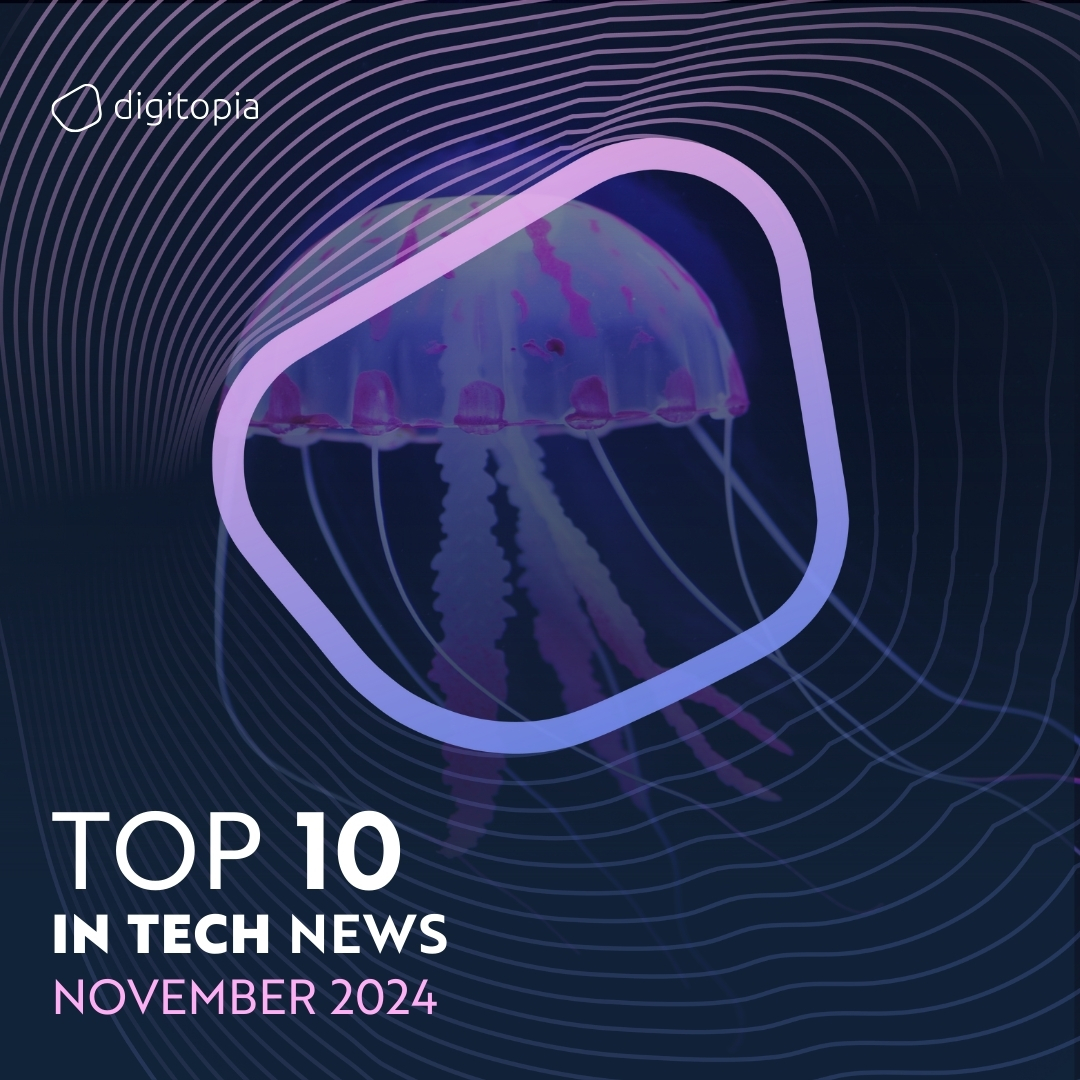
1- AI Agents: Revolutionizing the Workplace
AI agents are changing how we work by taking on tasks like financial reconciliation, customer support, and IT management, freeing employees to focus on strategic goals. Microsoft’s tools like Copilot and Dynamics 365 enable customizable agents that leverage advanced AI to handle complex workflows. With features like Copilot Studio, users can create tailored agents without coding, connecting them to business data for personalized solutions. Safety measures, such as human oversight and secure controls, ensure reliable and responsible use. These agents mark a new era in workplace efficiency, reducing routine workloads and driving innovation.
Source: Microsoft News
2- What Trump’s Second Presidency Means For AI, Cybersecurity And Crypto
As Donald Trump prepares for a potential return to the White House, the tech industry is bracing for significant policy shifts. Key areas of focus include AI, cryptocurrency, cybersecurity, energy, and semiconductor production, all aligned with his “America First” strategy. The administration may prioritize deregulation to accelerate AI development, counter China’s dominance in the sector, and support domestic semiconductor manufacturing while extending export restrictions. On cryptocurrency, Trump’s evolving stance suggests a lighter regulatory approach to stimulate industry growth, though details remain uncertain. Immigration policies could restrict access to global talent, prompting a push for local workforce development in tech-intensive fields. The overarching vision is to solidify U.S. leadership in global technology through innovation-driven, flexible policies.
Source: Forbes
3- DOJ Pushes for Google Breakup: Chrome Sale and Major Overhauls Proposed
The U.S. Department of Justice has proposed major structural changes to Google, including selling its Chrome browser and potentially divesting the Android operating system, to curb its dominance in internet search. These measures follow a federal ruling declaring Google’s monopoly over search services illegal, with further arguments set to be heard in April. The DOJ also aims to prevent Google from paying partners like Apple to make its search engine the default and proposes allowing rivals access to Google’s search index and browser. Google has criticized the proposals as extreme, warning they could harm U.S. tech leadership and consumer security, and plans to appeal the ruling. The incoming Trump administration’s stance may influence the case, with conflicting signals from Trump and Vice President-elect JD Vance on whether to pursue a breakup.
Source: Guardian
4- Robotaxis: The Journey to Winning Passenger Trust
Robotaxis are navigating a challenging path to earn passenger trust as companies like Waymo and Zoox showcase innovative designs and features aimed at making autonomous rides feel safe and comfortable. Waymo emphasizes transparency, with screens showing what the car “sees” to reassure passengers, while Zoox adopts a more immersive, distraction-free design. Despite advancements, public hesitation remains high, with safety being a key concern, amplified by incidents like Cruise’s 2023 pedestrian accident. In the US and China, robotaxi deployment is expanding, but regulatory hurdles and financial losses continue to test the industry’s growth potential. As competitors like Tesla and General Motors push forward, the race to win over skeptics is proving as critical as the technology itself.
Source: BBC
5- Can the U.S. Meet Its Ambitious EV Goals by 2032?
The U.S. government’s proposed emissions standards aim to make electric vehicles (EVs) two-thirds of all new car sales by 2032, accelerating the transition by several years. While challenging, experts believe advancements in battery technology, improved charging infrastructure, and lower EV prices will make the goals achievable. Automakers like GM, Toyota, and Honda are ramping up their EV offerings, which will expand consumer options and drive market growth. California’s aggressive EV policies are expected to influence national trends, pushing the market closer to the proposed targets. Industry leaders stress that collaboration between automakers, governments, and infrastructure providers will be essential to meet these ambitious objectives.
Source: CNN
6- Amazon Challenges Nvidia’s AI Chip Dominance
Amazon is ramping up its efforts to rival Nvidia in the AI chip market with the upcoming release of Trainium 2, designed to train large AI models. Leveraging its Annapurna Labs acquisition, Amazon’s chips promise cost savings of up to 40%, attracting companies like Anthropic, Databricks, and Deutsche Telekom. The company’s $75 billion investment in technology infrastructure for 2024 underscores its commitment to AI innovation. Despite these strides, Nvidia remains dominant, earning $26.3 billion in AI chip sales in a single quarter, while Amazon’s AWS division matched that revenue across all services. Experts believe Amazon’s push for alternative options could gradually shift the market balance.
Source: Nasdaq
7- Jaguar Faces Backlash Over Bold Rebrand and Ad Campaign
Jaguar’s managing director, Rawdon Glover, has defended the company’s latest rebrand and ad campaign, which features vibrant visuals and models without showcasing cars or the iconic cat logo. The “copy nothing” campaign aims to break away from traditional automotive marketing and appeal to a contemporary audience, drawing both praise and criticism online. Despite social media backlash, including a sarcastic comment from X CEO Elon Musk, the campaign garnered over 160 million views. Critics argue that moving away from Jaguar’s classic symbols risks alienating loyal fans, though Jaguar insists the reimagining reflects its commitment to inclusivity and modern relevance. The company is also investing in electric vehicles, with the first electric Range Rover set for delivery in late 2025.
Source: The Guardian
8- Gravesend Showcases the Future with Crawlybots and AI Innovation
The Innovation Showcase in Gravesend offered the public a glimpse into the future, featuring cutting-edge technology like Crawlybots—flexible robots with LED eyes designed to mimic animal traits. Organized by Fourth Portal, the event brought together experts from leading universities and local businesses to highlight the potential of robotics and AI to improve lives. Talks by the University of Nottingham team and interactive exhibits inspired attendees, with many, including volunteers and visitors, expressing hope for Gravesend’s transformation into a technology hub. Organizers emphasized the importance of blending science and art to encourage exploration and innovation in the community.
Source: BBC
9- Snapchat Spectacles 5: A Glimpse into the Future of AR Wearable Technology
Snapchat’s 5th Generation Spectacles bring augmented reality to a new level, offering innovative features like virtual drawing, interactive gaming, and immersive educational tools. Designed with developers in mind, these lightweight glasses integrate advanced technology directly into their frame, eliminating the need for external devices. While challenges like a limited 46-degree field of view remain, the Spectacles showcase the potential of AR for entertainment, education, and beyond. Currently available exclusively to developers for $99 per month, this device signals Snapchat’s commitment to building a robust AR ecosystem before a broader consumer launch. The Spectacles 5 sets the stage for AR’s role in shaping everyday digital experiences.
Source: VOI
10- 6 Common IT Mistakes That Could Derail 2025 Tech Strategies
As AI adoption accelerates, IT teams face predictable yet preventable pitfalls. Mishandling AI governance leads to security vulnerabilities and biased outputs, while ignoring emerging regulations creates costly compliance risks, especially as global laws tighten around AI applications. Many organizations also struggle with outdated data quality practices, resulting in flawed AI models and wasted resources. In the rush to innovate, security measures are often compromised, leaving businesses vulnerable to sophisticated hybrid and quantum-powered cyberattacks. Compounding these issues, outdated skills training fails to keep pace with rapid technological advances, exacerbating workforce gaps in AI and quantum computing. Addressing these challenges now is critical to avoiding disruptions and ensuring sustainable digital transformation.
Source: Forbes

